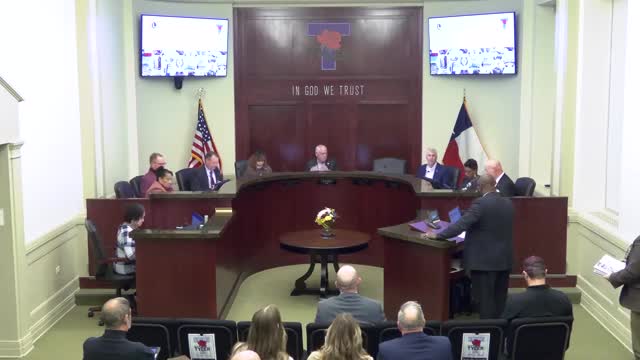Private collector Linebarger outlines Tyler delinquent-tax process, collection results and tax‑sale program
Get AI-powered insights, summaries, and transcripts
Subscribe
Summary
Attorney Jim Lambeth of Linebarger delivered a detailed briefing on the city’s delinquent‑tax portfolio, collection methods, tax‑sale activity and several recent recoveries; he said the collector is paid a 15% fee added to delinquent accounts and summarized accounts in deferral, bankruptcy and litigation.
Jim Lambeth, an attorney with Linebarger, Goggan, Blair & Sampson, told the City Council on Jan. 22 that his firm’s work collecting delinquent city property taxes includes outreach, litigation and online tax sales and that those efforts are funded by a 15% collection fee added to delinquent accounts, not by the City of Tyler.
The presentation outlined why liens exist as of Jan. 1 of each tax year, the typical billing and delinquency timeline, and how the firm prioritizes business personal property early because it can be removed from the jurisdiction. Lambeth said taxpayers may pay current-year (2024) taxes without penalties through the end of January; business personal property and real‑estate delinquency dates differ by statute and by property type.
Lambeth gave the council a snapshot of the city’s July 1, 2024 delinquent roll and recent activity. He said roughly 27.82% of delinquent accounts were in deferral and about 1.64% were in bankruptcy; combined with other protections, roughly one‑third of the turnover cannot be collected immediately. He reported the city’s turnover (delinquent amounts the city forwarded for collection) was $469,649 for tax year 2022 and $480,236 for 2023, and that the firm collected $505,034 during the most recent reporting period. Lambeth said letters mailed during the year totaled 9,550, aggregating about $4 million in taxed value for outreach purposes.
The firm described its enforcement tools: intensive address research, phone and in‑person visits, negotiated payment agreements and, as a last resort, litigation and tax sale. Lambeth said the firm targets vacant or abandoned properties for sale and rarely sells occupied homesteads. He noted the firm maintains an online sheriff‑sale auction and that moving the sale online has increased bidders, excess proceeds and recoveries for taxing entities.
Lambeth cited several recent results for Tyler entities: lawsuits filed (28 accounts, $31,492), lawsuits disposed (64 accounts, $63,000), pending suits (34 accounts, $72,000), 10 properties sold at tax sale for roughly $898,000 and an eight‑year average collection rate of about 100.75%. He highlighted the sale and redevelopment of a former Holiday Inn Express (taxes and hotel occupancy taxes collected) and a housing‑infill outcome where three narrow lots were replatted and are now tax‑producing single‑family houses (example: a lot previously valued at $3,000 now part of a home valued at about $214,000).
Lambeth described administrative services the firm provides at no charge to the city, including training (Truth in Taxation sessions), bankruptcy representation, appellate work and legislative analysis related to ad valorem taxation. He also described the firm’s local staff and data capabilities, noting the firm aggregates national receivables to purchase address and locating data more cheaply and to improve mailing accuracy.
The presentation concluded with a brief question period; council members asked about individual properties and the online auction process. Lambeth said the property known as the “Tyson House” was scheduled for the next tax sale and that, per the property tax code, the sale minimum reflects the judgment amount and distribution of proceeds follows the statutory priority rules.
